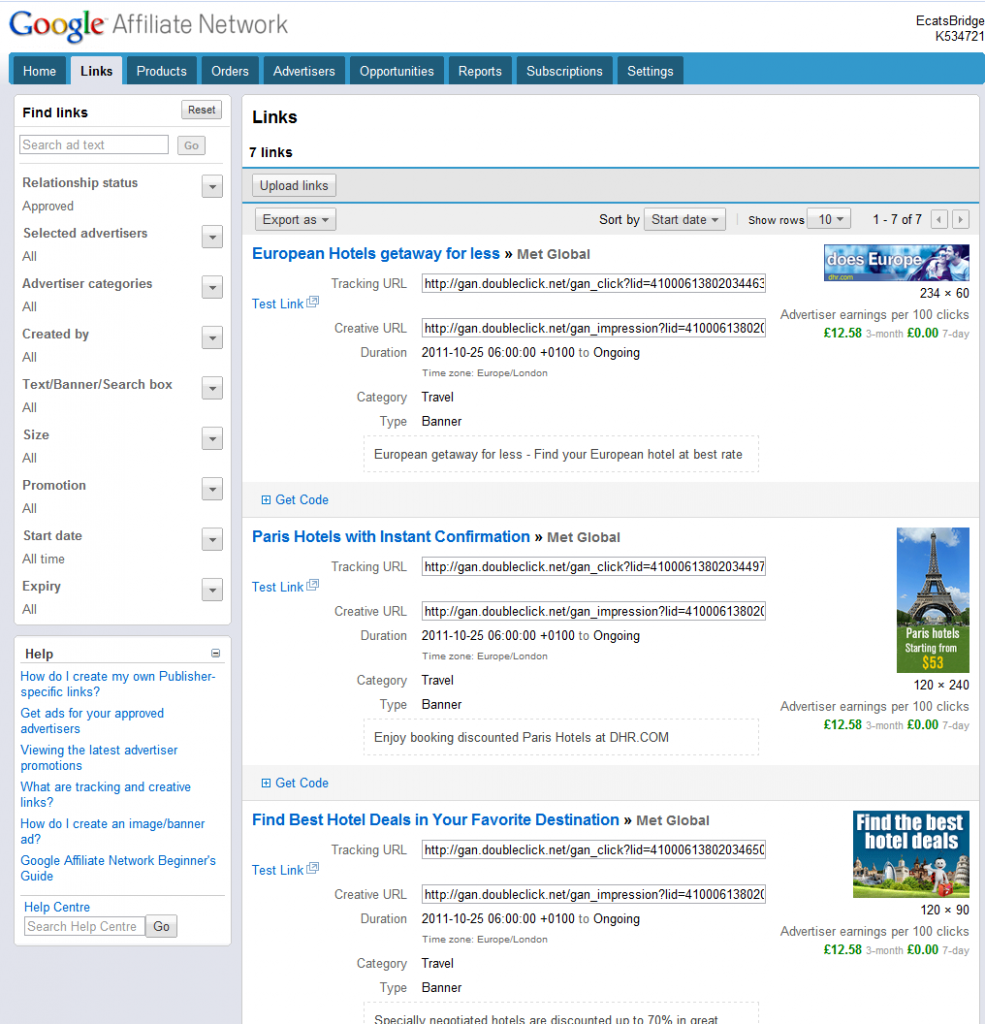When Written: April 2012
In these days with almost all information being on the web there may seem little point in visiting any of the traditional shows like the ones held in Earls Court in London or the NEC in Birmingham. Is there even any benefit from the opportunity to network with the people on the stands since the advent of social web sites like twitter and Facebook where you can gain easy access to a company or a prominent industry figure, albeit on their terms rather than the immensely satisfying feeling of cornering the same person at an event with a series of important but tricky to answer questions?
It is this ability to meet face-face with the people in the industry, this along with the likelihood of finding a company that you previously were not aware of that is probably the single biggest reason for attending such shows. It is mainly for these last two reasons that I try to attend a number of these shows. In any year there are certainly two shows that I try not to miss, one is Internet World which has a smorgasbord of internet based companies and products. Whilst it is no longer the size of the large computer shows of the eighties that I used to attend, it still has a variety that is difficult to find elsewhere. The other show that is on my must visit list is the much smaller and more focused TFM&A show. This stands for Technology For Marketing & Advertising and from its title you can guess what it’s about. As is often the case with such shows, there are smaller shows combined within it and one of these is the OA&A show, this stands for Online Advertising & Affiliate Expo.
I suspect that calling Expo is an attempt to make it sound bigger that it actually is. However in this case size is not that important; rather it is the quality of the exhibitors that is the reason to attend. With both these shows you can expect a high percentage of Marketing types and consequentially a large number of confusing and often cryptic terms and phrases. Often when asked by an exhibitor if I was interested in their products I replied that I might be if only I could understand what their billboard full of catchy phrases means, a problem that many of them sympathised with, ‘Cross Channel engagement with prospects’ and ‘management of Affiliate relationships’ are just a couple of the easier. You are bombarded with stands that make all sorts of claims and it is easy to become a little jaundiced after an hour or so of this attack on the senses. But this year like last I was on a mission, which was to find some companies willing to advertise on our and our clients’ web sites.
A couple of years ago I had a great deal of success with this approach and within a month or so of the show I had signed up £7000 worth of advertising on just one site. Since then the market has toughened quite a bit and whilst the interest is still there, the amounts being offered are smaller and so a renewed effort was required. Rather than approach each individual company who might be interested in advertising a simpler approach is to join an affiliate program. These are run by companies whose aim is to put the advertisers ( them ) in touch with the publishers ( you ) usually via a semi-automated web site where you will select companies that you think will want to advertise on your website. Your request will be forwarded to the company in question who will approve your site for their adverts or otherwise. If approved you can select which of their adverts will suit your site and the necessary code will be supplied for you to paste into your site. The affiliate company also provides you with a reporting web site for you to check to see how your adverts are doing and if they have earned you any money.
A lot of the advertisers have moved away from the pay per click to a commission paid on sales which obviously suits them better; however with most business the important thing is to build brand and you and other sites are effectively helping to do this for free with such an payment module, but if you are happy with commission method then there are plenty of advertisers to choose from. There are many affiliate companies who offer this form of advertising, LinkShare (www.linkshare.com ) are one of the bigger ones and Google has recently launched its own affiliate program in the UK recently (http://www.google.com/ads/affiliatenetwork ).

The easy way to contact potential advertisers is via an Affiliate program
The choice of which advertisers to choose is often one of guessing which may fit your visitor profile and then trying it. Google can help here as they provide very extensive stats on each of their advertisers at their ‘doubleclick ad planner site’ (https://www.google.com/adplanner ) , here you can get a lot of demographic information on the visitors to many internet web sites, just take a look at our own PcPro web site (https://www.google.com/adplanner/site_profile#siteDetails?uid=domain%253A%2520pcpro.co.uk&geo=GB&lp=false ) to see what sort of information about the web site visitors is gathered, everything from age, education and income as well their interests, all useful stuff to a prospective advertiser or publisher.
Using on-line services it is possible to see a profile of the visitors to many web sites
There was a serious worry that after May 26th this year a lot of this data will no longer be collected from any web site with a UK presence when the new privacy laws on web sites prohibiting the placing of ‘non-essential cookies’ without the user’s permission comes into effect. However it now seems that web analytic cookies will be allowed ( http://alphagov.files.wordpress.com/2012/03/gds-cookies-implementer-guide.pdf ) so quite what cookies are banned on the basis of privacy is difficult to figure out. Now obviously all this information is anonymised and so information about a particular individual cannot be discovered from this web site but it is useful for getting an idea of the type of user accessing the site and consequently who might be interested in your advert.
Once you have selected a range of companies whose adverts might be a good fit for your web site and its visitors then you need to sit back and wait for the rejections to come in. You see, these companies have to agree to have their adverts on your web site and to decide this they have various criteria which are not always totally clear so don’t expect to be able to host just anyone’s adverts. But don’t be disappointed if you get a lot of rejects at first, we have found that once you start to host some adverts then other advertisers will ‘jump on board’ and sign up. So just because you are rejected at first, try reapplying after a month or so. The other reason may be that the companies involved can’t find the traffic stats of your site. For this they may take a look at Alexa (http://www.alexa.com/ ) or Google Trends (https://www.google.com/adplanner/site_profile#siteDetails?uid=d+pcpro.co.uk&geo=001 ) or Google Ad Planner as mentioned earlier. Sometimes supplying them with your own stats web page can help in the decision process.
When an advertiser accepts your web site it is then a simple task of selecting which of the many advert formats that will fit on your web site and then copy the supplied code and pasting it either directly on pages of your web site or into whatever advertising engine you are running on your site. I currently use the excellent XIGLA banner engine (http://www.xigla.com/ ) on all the sites as we use ASP and ASP.NET, but there are many others. Also, most CMS’s have advert modules that you can use if your site is built using one of these. The reason for using such engines is that you can designate zones on your pages where adverts will appear and then decide which adverts will appear where without having to recode your pages. The engine will also allow you to rotate several adverts in a zone so your visitors get to see a selection and hopefully this will increase the chance that they will click on at least one of them. The advertising engine will also give you reports on how popular each advert is via its click through rate which might be different to the stats that the affiliate site gives you as they are often only interested in clicks that have converted to sales. Once the adverts are placed on your web site then it is just a case of monitoring the performance of these adverts via the supplied web interface of the affiliate company.
Do bear in mind that the advertising space on your web site can be valuable real estate for some companies but they can be put off if you are running too many adverts particularly if they are from very different industry sectors so making sure that the adverts you are running are generating you some revenue is very important.
Using the big affiliate networks is obviously not the only route to generating revenue from advertising on a web site; I have found often that approaching the smaller specialist affiliates or even the companies directly can pay off big rewards. One of our sites is about Bridge, the card game, and this regularly attracts enquiries from gambling companies particularly Poker sites. These adverts seem to be popular with the visitors to this web site and so hosting their adverts produces a good income flow without being too intrusive to the visitors to the web site. Good luck.
Article by: Mark Newton
Published in: Mark Newton
